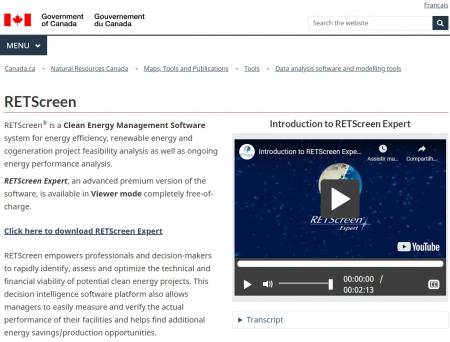ACTIONS
- Protect and safeguard cultural and natural heritage
- Learning and educational opportunities
- Cultural participation/social inclusion
- Sustainable tourism
- Support research
- Employment (recruiting, training, safety)
- Energy consumption, greenhouse gas emissions
- Waste management and reduction
- Transport (forms of, energy use)
- Commercial activities including copyright and IP
- Governance and management
- Security, disaster preparedness, risk reduction
- External partnerships and collaborations
- Toolkit/framework/roadmap
- Case studies
- Video
- Software - analytical tool
RETScreen Expert

Intended Audience
Professional and decision-makers involved in assessing and optimizing potential clean energy projects, and those involved in measuring and verifying energy-usage performance of facilities to help find additional energy savings/production opportunities.
- Natural Resources Canada (NRCan)
“RETScreen® is a Clean Energy Management Software system for energy efficiency, renewable energy and cogeneration project feasibility analysis as well as ongoing energy performance analysis.
RETScreen Expert, an advanced premium version of the software, is available in Viewer mode completely free-of-charge.
RETScreen empowers professionals and decision-makers to rapidly identify, assess and optimize the technical and financial viability of potential clean energy projects. This decision intelligence software platform also allows managers to easily measure and verify the actual performance of their facilities and helps find additional energy savings/production opportunities.”
Avaiable in
- English
- Arabic
- Bengali
- Bulgarian
- Chinese
- Croatian
- Czech
- Danish
- Dutch
- Farsi
- Finnish
- French
- German
- Greek
- Hindi
- Hungarian
- Indonesian
- Italian
- Japanese
- Korean
- Macedonian
- Polish
- Portuguese
- Romanian
- Russian
- Serbian
- Spanish
- Swahili
- Swedish
- Tagalog
- Telugu
- Thai
- Turkish
- Ukrainian
- Urdu
- Vietnamese
SDGs LINKAGES
The resource can be used to increase the use of renewable energy in the energy mix (SDG 7.2), and to enhance energy efficiency (SDG 7.3). Working to decouple any institutional growth from environmental degradation supports SDG 8.4. Developing sustainable, reliable infrastructure supports SDG 9.1, and upgrading and retrofitting to enhance resource use and renewable energy supports SDG 9.4. Reducing the impact of cities supports SDG 11.6, and integrated planning that incorporates resource efficiency and mitigating climate change supports SDG. 11.B. Ensuring sustainable and efficient use of natural resources supports SDG 12.2. Adopting sustainable practices supports SDG 12.6. Enhancing institutions’ contributions to climate change mitigation contributes to SDG 13.3. As RETScreen can be applied anywhere, and the resource includes specific climate data for all countries, it can be used to support SDG 9.A, on developing sustainable and resilient infrastructure in the Global South.
Click on the SDG Target to discover Our Collections Matter indicators
-
Our Collections Matter indicators:
- Proportion of energy that comes from renewable sources.
- Date to achieve net zero, and milestones towards that date.
-
Our Collections Matter indicators:
- Reduction in energy use.
- Upgrade of old equipment to more efficient equipment.
- Uptake of renewable sources of energy.
-
Our Collections Matter indicators:
- Plans in place to increase resource efficiency, reduce consumption, and to decouple economic growth from environmental degradation.
-
Our Collections Matter indicators:
- Development of research-useful collections to support reliable, sustainable and resilient use by researchers and others.
- Number and proportion of collections facilities and stores that support economic development and human well-being.
- Number and proportion of collections facilities and stores that provide affordable and equitable access for all.
- Investment in collections facilities.
- Inclusion of collections information in regional and transborder initiatives, notably via digital access for discoverability.
-
Our Collections Matter indicators:
- Number and proportion of collections facilities that make efficient use of resources, with an ongoing drive for efficiencies and reductions in energy use and waste of all forms.
- Number and proportion of collections facilities that use clean and environmentally sound technologies, including climate-friendly energy sources and materials, with an ongoing commitment to reduce greenhouse gas emissions and waste of all forms.
- Number and proportion of collections facilities that adopt and/or prioritise collections-related processes and practices to reduce greenhouse gas emissions and waste of all forms.
-
Our Collections Matter indicators:
- Plans in place to reduce negative impacts on air quality, and volume and forms of waste.
- Plans in place to eliminate waste of all forms as soon as possible.
-
Our Collections Matter indicators:
- Proportion of local governments that adopt and implement local disaster risk reduction strategies in line with the Sendai Framework for Disaster Risk Reduction 2015-2030a.
- Disaster Risk Reduction strategies and plans in place, in line with the Sendai Framework for Disaster Risk Reduction, to ensure collecting institutions and collections are factored into planning, and contribute effectively to Disaster Risk Reduction.
- Collections-based institutions included in local plans for social inclusion, resource use, and Disaster Risk Reduction.
-
Our Collections Matter indicators:
- Reduction of material footprint in terms of reductions in consumption of biomass, fossil fuels, metal ores and non-metal ores.
-
Our Collections Matter indicators:
- Clear visions, strategies and plans in place for all aspects of sustainability – environmental, social and economic (people, planet, prosperity)- across all areas of activity.
- Visions, strategies and plans relating to sustainability to be publicly available and incorporated into planning documents.
- Commitments to be in line with local, regional, national and/or international targets and ambitions.
- Incorporation of sustainability into reporting for funders and other stakeholders, including the public. Reporting to include commitments and progress towards targets.
-
Our Collections Matter indicators:
- Plans in place to enhance positive contributions to addressing climate change through use of collections. Plans in place to ensure collections, collections institutions and broader society can adapt effectively to climate change.
- Plans in place for effective education and awareness raising on climate change mitigation, adaptation, impact reduction and early warning.
- Plans in place to reduce negative contributions of collections-related functions, e.g. measuring greenhouse emissions with plans and targets in place to reduce them.
